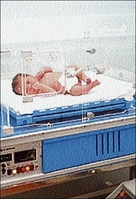Who should live? High medical costs put premature babies at risk
Published: Sunday | June 28, 2009

THE LIVES of premature babies are being put at risk by an acute shortage of equipment and exhorbitant costs in meeting their special needs, say health officials, who are caught on the horns of a dilemma.
They must decide whether to use millions of dollars on equipment to increase the survival chances of only a few premature infants, or to use this same money to provide treatment for hundreds of sick children.
Data from the Ministry of Health and the Environment show that between 2007 and 2008, 2,016 babies were born prematurely. In addition, figures from the Registrar General's Department reveal that over the same period, 1,031 babies died within 28 days of birth.
Dr Minerva Thame, head of the Neonatal Intensive Care Unit at the University Hospital of the West Indies (UHWI), says that hospital administrators are caught in a predicament, due to the exorbitant costs and numerous health problems associated with pre-term birth care.
quality of life
"Some points of view include, 'Why are you spending $200,000 to save this 500 'gramer's' (approximately one pound) life, when you could use that same $200,000 and buy immunisation for 10,000 children?'
"Health officials will argue like this because you are able to save 10,000 children as opposed to one child," said Dr Thame.
She added that even after survival, the quality of life and the health complications often associated with pre-term births are numerous, as the financial burden is steep.
"After you have had that 27-weeker survive, it doesn't end there," she said.
Thame explained that these children usually have hearing, speech and eye problems, as well as trouble with cognitive functions.
"And if you are going to continue to try and have these children survive, then you are going to have to put in place all the different facilities that you now need to take the baby into childhood, so it doesn't stop at neonate," Dr Thame told The Sunday Gleaner.
She added: "Can the country afford it? You have to ask those questions, because you can't work in isolation."
Checks with several of the island's major hospitals revealed a severe shortage in some of the most critical machines and equipment used to assist in the survival of premature infants.
The Sunday Gleaner discovered that there are 12 working ventilators among four of the island's major hospitals.
University Hospital of the West Indies (UHWI) has four, which it received late last year after the hospital administrators became aware of the severe shortage, and is expected to acquire two more of the lifesaving machines later this year.
However, Dr Thame admitted to The Sunday Gleaner that this is still not enough. "Six is not enough if you compare other islands, like for instance Nassau, where they have 25," she said.
Currently, babies from other hospitals across the island, including Mandeville, May Pen, St Ann's Bay and Savanna-la-Mar, are transferred to UHWI's neonatal unit.
The neonatal specialist further admitted that the survival of premature babies did not depend only on the availability of ventilators.
"You have to have the staff, the nurses, tubings, the extra equipment that goes with the ventilator, and all of that," she said.
Inquiries by The Sunday Gleaner also revealed that there was a shortage of incubators and warmers at some hospitals across the island. These machines help premature babies maintain a stable body temperature and use their energy reserves to gain weight and get healthier.
There is also a significant shortage of suitable sterile facilities where total parenteral nutrition (TPN) treatments can be safely prepared and administered to infants without the risk of infecting the newborn.
TPN is used to provide sustenance to premature infants, as in most cases, they are too young to feed and digest on their own.
The procedure is currently done at the UHWI, although the hospital no longer has a sterile lab in which to prepare the treatments. Sources informed The Sunday Gleaner that the lab had been closed as a result of high maintenance costs.
Pre-term birth is a leading cause of new-born death in Jamaica and across the globe. Doctors say that one in every 10 babies will be born premature.
athaliah.reynolds@gleanerjm.
PRE-TERM FACTS
A full-term pregnancy is defined as anything between 38-42 weeks of gestation.
A premature infant is one that is born before a completed 37 weeks.
Survival Rate in Jamaica
A premature infant's survival chances greatly depend on its birth weight:
Age/Chance of Weightsurvival
24-25 wks (500-600 grams)- 30 per cent or less
26 wks (600-700 grams) - 40 per cent
30 weeks (900 grams) - 50 per cent
30 wks and above (1,000-1,500 grams)- 60 per cent and greater
In the United States, a baby born at 24-25 weeks has a 50 per cent chance of surviving.
Some serious complications of premature birth are:
Respiratory distress syndrome:
A serious breathing problem that affects mainly babies born before 34 weeks of gestation.
Bleeding in the brain:
Most common in babies born before 32 weeks of gestation.
Bleeding in the brain is called intraventricular haemorrhage. It can cause pressure in the brain and brain damage.
Patent ductus arteriosus:
A heart problem that is common in premature babies. Untreated, it can lead to heart failure.
Necrotising enterocolitis:
A potentially dangerous intestinal problem.
Retinopathy of prematurity:
An eye problem that occurs mainly in babies born before 32 weeks of gestation. In severe cases, treatment is needed to help prevent vision loss.
Costs for care
Price range for some of the tools and equipment used in a neonatal intensive-care unit:
Ventilators: US$20,000-$30,000 (J$1.8- $2.7 million)
Incubators: US$7,000 (J$623,000)
Infant warmers: US$10,000 (J$890,000)
Total parenteral nutrition: US$1,200 (J$106,800)
Monitors: US$5,000-$20,000 (J$445,000-$1.8 million)
CPAP machines: US$500-$2,000 (J$44,500 - $178,000)
Source: Jamaica Hospital Supplies








